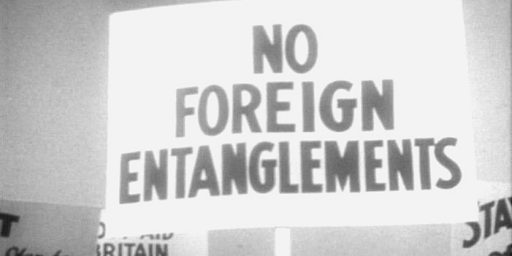Opposing Dumb, Unnecessary Wars Is Not “Isolationism”
Contrary to what Senator McCain, seeking realism in military policy does not make one an isolationist.
Yesterday on ABC News’s This Week, Senator John McCain criticized those members of his party who are daring to question the wisdom of military action in Libya and elsewhere:
Former Republican presidential nominee Sen. John McCain (R-AZ) took aim at his party for what he called its growing movement towards isolationism, chastising the current GOP presidential field for not supporting U.S. military intervention in Libya and calling for speedy troop withdrawals from Afghanistan.
“This is isolationism. There’s always been an isolation strain in the Republican party, that Pat Buchanan wing of our party,” McCain told “This Week” anchor Christiane Amanpour. “But now it seems to have moved more center stage.”
At the first major Republican presidential primary debate in New Hampshire last week, several candidates criticized U.S. military involvement in Libya, while on Afghanistan former Mass. Governor Mitt Romney said, “It’s time for us to bring our troops home as soon as we possibly can” based on the advice of military commanders.
“I wonder what Ronald Reagan would be saying today?” questioned McCain, saying the isolationism is a stark departure from traditional Republican foreign policy positions. “That is not https://www.outsidethebeltway.com/wp-admin/post-new.phpthe Republican party that has been willing to stand up for freedom for people for all over the world.”
McCain’s attack was echoed by fellow Senator Lindsey Graham who basically said that Congress should let the President do whatever he wants in Libya:
On Meet the Press this morning, Sen. Lindsey Graham (R., S.C.) said “Congress should sort of shut up and not empower Qaddafi” by discussing the possibility of cutting off funding for military operations there
Joining McCain and Graham is former Bush Administration lawyer John Yoo, best known for writing the memos that justified torture and the Unitary Executive theory, who criticized Republicans for insisting that the President follow the law:
Republicans returned to power in the House of Representatives on a promise to take the Constitution seriously. They appealed to Americans worried about ObamaCare, expanding regulations and the exploding national debt by promising to rein in the federal government. But the Libyan war is tempting Republicans to sacrifice constitutional principle for partisan advantage.
By accusing President Barack Obama of violating the War Powers Resolution, House Republicans are abandoning their party’s longstanding position that the Constitution allows the executive to use force abroad, subject to Congress’s control over funding. Sadly, they’ve fallen victim to the siren song of short-term political gain against a president who continues to stumble in national-security matters.
It’s not surprising to hear McCain, Graham, and Yoo criticizing Republicans daring to question a President’s foreign policy choices, even when that President is a Democrat. Similar criticism has also come from John Bolton and Liz Cheney, among others. These people are, for lack of a better term, neo-cons who view American military force as something that ought to be used to make the world more “free,” regardless of whether a particular military adventure actually implicates the national interests of the United States. The fact that some members of Congress are now criticizing both the war in Libya and the war in Afghanistan is a direct challenge to their position and, if it succeeds in becoming a voice of influence in the GOP, a serious challenger for the voice of a future Republican Administration.
What’s outrageous, though, is the manner in which McCain and the others are very clearly trying to tie the current debate within the GOP with the “isolationist” label, a label that has become associated with the assertion that it was American policy in the years leading up to World War II that left us vulnerable to Germany and Japan. Leaving that historical debate aside for now (though I think it’s one worth exploring), the idea that questioning the Libyan action specifically is “isolationism” is, as Bruce McQuain points out, simply absurd:
Being against Libya has absolutely nothing to do with “isolationism”. It has to do with involving ourselves in yet another military action at a time when our current military is stressed with a seeming unending deployment cycle, spending money we don’t have for something that has no connection whatsoever with our national interest and letting the UN and NATO dictate our participation instead of Congress. Not to mention the fact that this is actually a real, live “illegal war” as opposed to the unfounded claim that Iraq was illegal.
Those four things alone are more than sufficient to oppose the war in Libya on sound principle.
It is also apparent that John McCain is a fan of perpetual nation building, even while the nation we’re “building” is resisting it. At some point, perhaps, it is time to reassess the situation and, like the mother bird to the baby bird, push the little blighter out of the nest. If you can’t get a country to stand up on its own after 10 years, chances are it isn’t going to happen. Iraq may not be the model of democracy or stability, but it at least is functional after the years we spent there. And we went in there later than Afghanistan and we turned it all over to the Iraqis in a reasonable amount of time.
Again, pointing that out doesn’t make one an “isolationist”. It makes one a realist.
The same point works equally well with regarding to Afghanistan. We are fast approaching the ten year anniversary of that war and, depending upon where one dates the beginning of the Vietnam conflict, it is now the longest sustained conflict in American history. When we went in there in October 2001, it was with the mission of destroying al Qaeda and its Taliban protectors. The first part of that mission, while not fully accomplished, has certainly been largely achieved. Al Qaeda is now a shadow of its former self and, to the extent it still exists, is more likely to be found in Somalia, Yemen and, apparently, among the very Libyan rebels were are supposed to be protecting. Our mission in Afghanistan now is aimed more at the idea that we can somehow create a stable democratic government in a nation where loyalty to the tribe is still more important than loyalty to Kabul, where the literacy rate is barely 25%, and where the current President has quite blatantly stolen at least the last two elections. What, exactly, are we going to accomplish there now that Alexander the Great, the British Empire, and the Red Army couldn’t? Instead of trying to create democracy in a tribal society, we ought to be concentrating out time on making sure al Qaeda doesn’t have a chance to strikes us again from one of the many other unstable countries in the Middle East.
That’s not isolationism, that’s realism, and that’s acting in the interest of the United States of America rather than some vision of creating a world safe for democracy, something we tried to do in 1917 and failed at miserably.
Senator Graham’s comments are even more absurd than Senator McCain’s in some respects. Essentially, he’s arguing that Congress should disregard its responsibilities under the constitution and the law (and regardless of what the good Senator may think about it, the War Powers Act is still the law of the land) and let the President do whatever he wants in Libya. That would be a dereliction of their duty under the Constitution.
Is there some political opportunism in the GOP opposition to the President’s military adventurism? Sure there is, just like there was political opportunism in Democratic opposition to similar policies by Republican Presidents like Reagan, Bush 41, and Bush 43. That doesn’t make them incorrect, though, and it ignores the fact that there is a growing caucus in Congress of Republicans who clearly wouldn’t accept policies like this even if the President were Republican. Ron Paul, Rand Paul, Justin Amash, Walter Jones, and Tom McClintock are just a few of the names that come to mind in that regard. Not only that, but even conservatives like Michele Bachmann and Allen West voted in favor of Dennis Kucinich’s anti-Libyan War resolution a few weeks back. Perhaps that’s because people just aren’t listening to people like John McCain anymore when it comes to issues like this. If so, that would be a good thing.







I agree. I’m more favorably inclined to the LIbya thing than you are, but while opposing it could be a symptom of isolationism, I don’t think it’s the main strain.
I also think that tagging it with the “isolationism” tag really nothing more than an ad hominem attack meant to cut off debate than anything else. It’s similar to, but not as severe, as bringing up Hitler and the Nazis because the obvious analogy that McCain was aiming for is to compare people questioning military action today with the “America First” movement of the 1930s, and the idea that they prevented the US from intervening in WW2 earlier.
well, how do you imagine he should characterize them, Doug? He can’t exactly tell the truth and point out that they are opposing these wars because the CiC is a Democrat, can he?
It’s like the old joke, with 32% tax rate capitalist, and 33% socialism.
Or in this case, 3 foreign wars good, just 1 or 2 foreign wars isolationist.
At least McCain is being consistent in his desire to bomb anyone and everyone. I just wonder where the opposing folks were when Bush 43 was pushing his “humble foreign policy”. File this entire issue under intellectual dishonesty.
This weekend NATO bombed:
1. A column of rebel vehicles
2. A block of civilian houses
Isolationism has nothing to do with opposition to having your tax dollars spent on randomly slaughtering poor brown people.
The main point, to me, is that it was fundamentally STUPID decision to go to war with Libya.
When K-Daffy gave up his WMDs in 2003, it was with the tacit acknowledgement that we wouldn’t attack him — that he didn’t need them to keep himself secure. That he’d be safer without them.
Now, in dealing with Iraq, North Korea, Syria, and other pains in the ass developing WMDs, they see that giving up your WMD program just means we’ll feel MORE free to attack you. Plus, we don’t keep our deals.
Bad precedent.
J.
McCain wants the military pulled out of Afghanistan and Libya so we can combat those arsonist brown folk that exist in his befuddled mind.
And keep in mind he’s not likely to run for election again.
This is the real McCain. And sadly as wacko as he seems the next GOP nominee will out wingnut even the black ace.
“Isolationism” is a strawman. There is a wide gulf between isolationism and current US policy.
Also, to add on to what Jay Tea said, US foreign policy over the past ~20 years (mostly the last 10) has proven to various nasty regimes that the only way to protect yourself against the USA is to actually acquire nukes.
Is there any problem that McCain doesn’t want solved via the use of military force? I don’t see why his increasingly cartoonish foreign policy views are taken seriously anymore.
generally agreed to a point, but i think the correct lesson is to not do anything to offend the US and its interests…however loosely and selectively defined they may be. short of a massive MAD-capable arsenal, im not sure how much of a deterent WMDs would really be.
Why don’t you ask the residents of Seoul and Tel Aviv?
Iran learned that lesson from the invasion of Iraq…
Well certainly that isn’t something new…
Interested, I like to think we’re better than this, that our word should be good. You’re free to disagree, of course.
J.
No, it’s not. Establishment Republicans, one and all, and certainly, not conservatives. What his comments are, is McCain trying to be the grand old man of the party.
Ponce, yes, lets hear about how Obama’s involved in Libya so he can kill off colored people. Yeah, that’s gonna fly.